
How To Exit Recovery Mode on iPhone 15? | Dr.fone

How To Get Out of Recovery or DFU Mode on iPhone 15?
Have you been working with Wondershare Dr.Fone - System Repair (iOS) to fix some system issues with your iOS device? If so, it would surely be put in Recovery Mode or DFU mode for this purpose. To retain your device back in normal condition, you will have to exit Recovery Mode iPhone or its DFU Mode. For that, this guide helps you with some comprehensive steps:
Upgrade to the Newest Dr.Fone Manage Your Phone Wherever You Go
Part 1: How To Exit Recovery Mode (Free Service)
While working for a specific operation, you might have put your iOS device in Recovery Mode. If so, taking it out of the Recovery Mode seems an impossible task. In such a condition, you can consider using the free service of Wondershare Dr.Fone. While no data of the iPhone 15 device is at risk, follow the procedure described below to exit Recovery Mode iPhone:
- Step 1: Open Dr.Fone and Continue With System Repair
Launch Wondershare Dr.Fone on your computer and proceed to select the Toolbox section from the left panel. Continue to the System Repair tool to initiate the required process.

Dr.Fone Mac version still has the old interface, but it does not affect the use of Dr.Fone function, we will update it as soon as possible.
- Step 2: Define the Nature of the Device
On the window that opens up, select iOS to define the nature of the iPhone 15 device that will be part of the process.
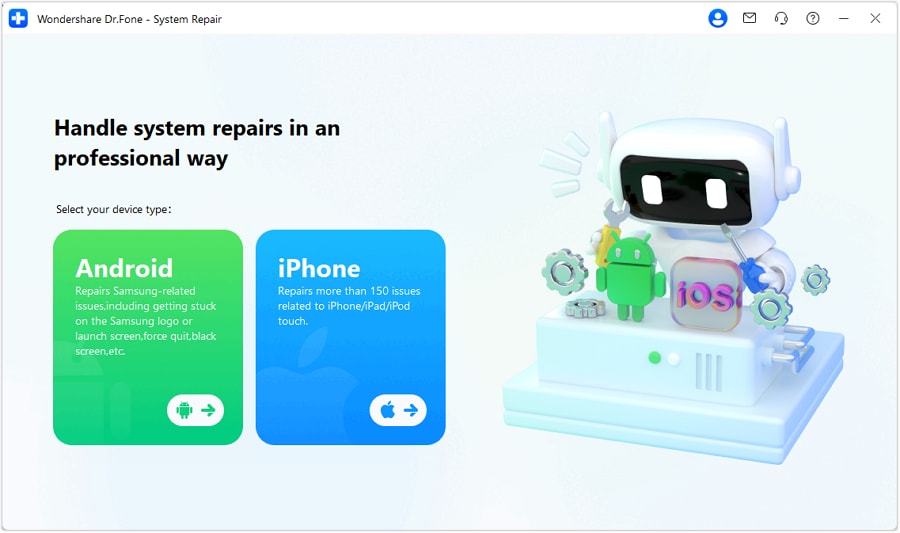
- Step 3: Select the Appropriate Mode of Repair
Continue to select Toolbox Repair from the options on the next screen.
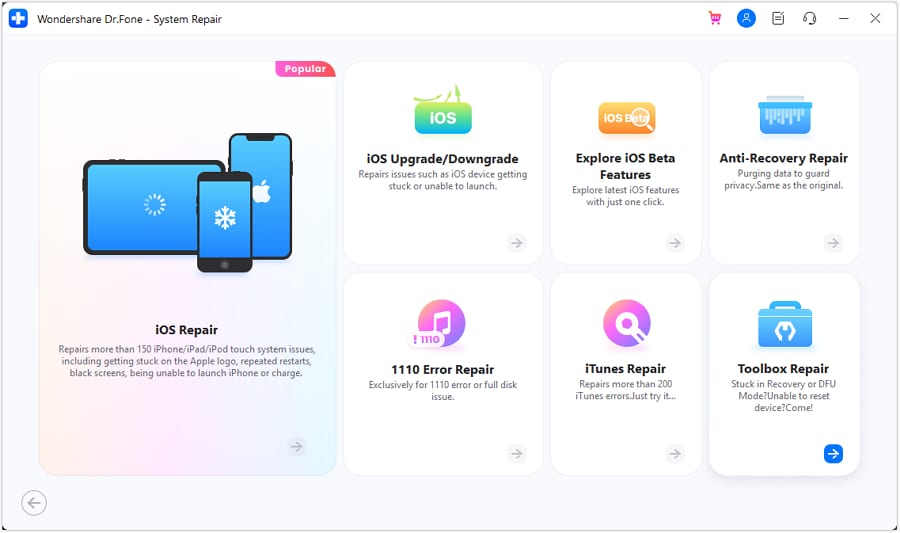
- Step 4: Verify Device Condition and Select Option
Verify if the screen of your iOS device is showing the respective visuals. If so, your iOS device is in Recovery Mode.

After verifying the situation of your iOS device, continue to select the Exit Recovery Mode option on the window that opens.
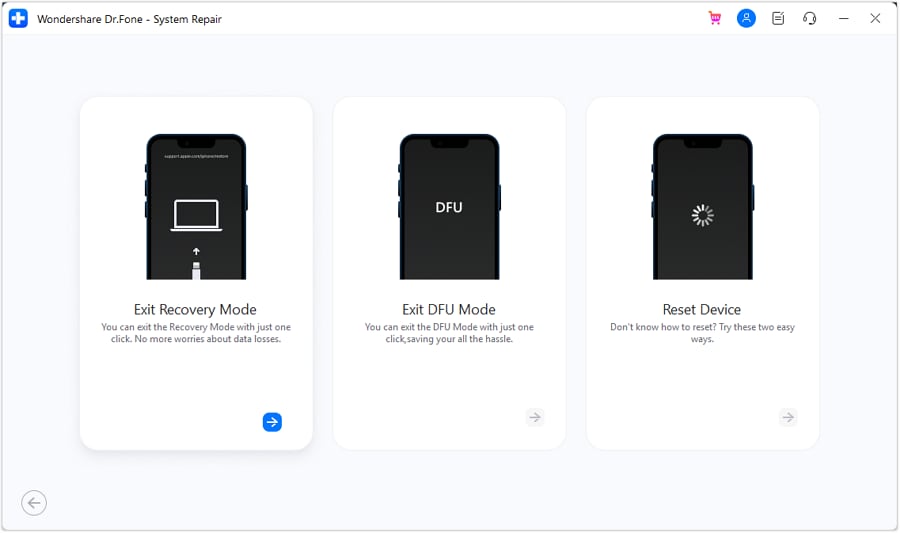
- Step 5: Exit Recovery Mode
The Exit Recovery Mode process is a one-click process that will execute the complete task. Click Exit Recovery Mode on the bottom of the screen to carry out the process.
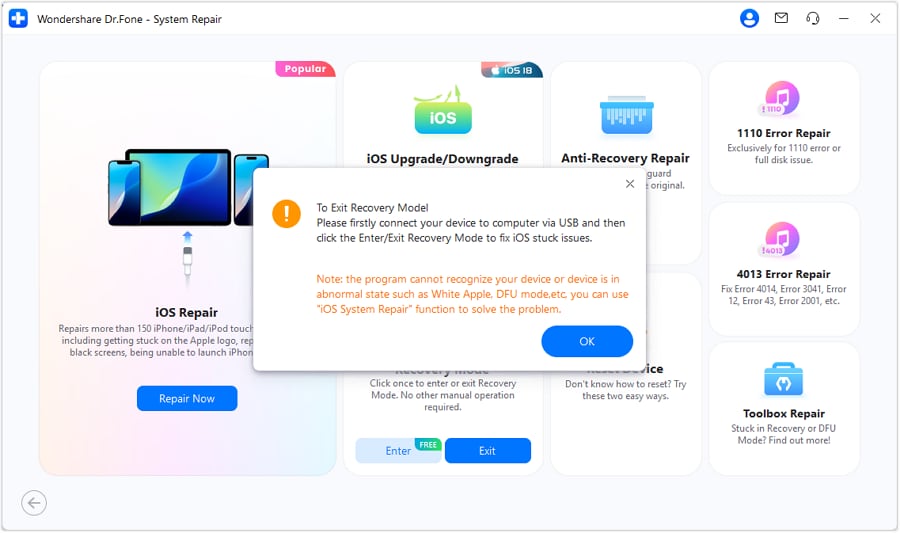
- Step 6: Execute the Process Successfully
The next window will display the completion of the process. Check if your iOS device is operational or not. If the device does not start, you can tap on the Standard Mode option below to fix the problematic device.
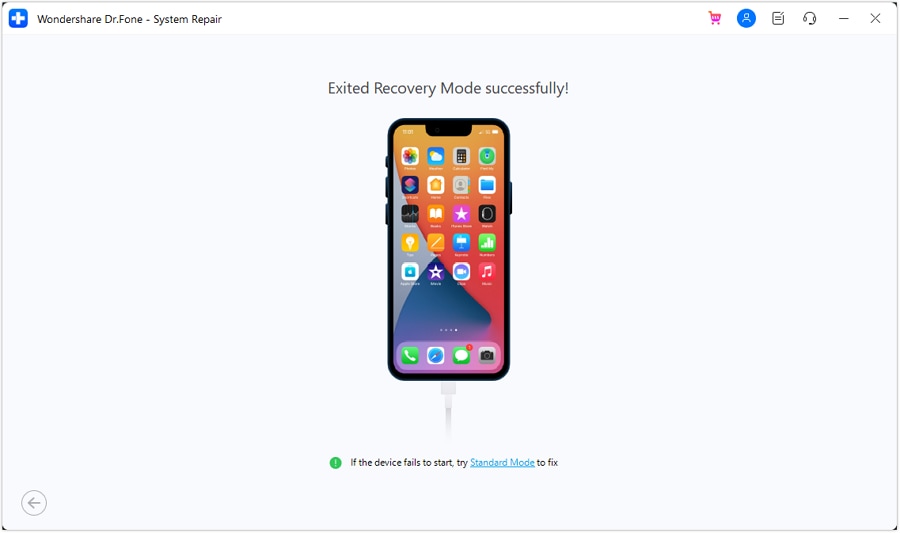
Part 2: How To Exit DFU Mode (Free Service)
Wondershare Dr.Fone - System Repair (iOS) also provides a dedicated feature of exiting the DFU mode through its service. If you intend to exit DFU Mode after accidentally putting the iOS device in this particular mode, follow the steps provided below for a comprehensive overview:
- Step 1: Navigate to Exit DFU Option
As you navigate into the Toolbox Repair function provided by System Repair (iOS), proceed to the next screen to select the option of Exit DFU Mode.
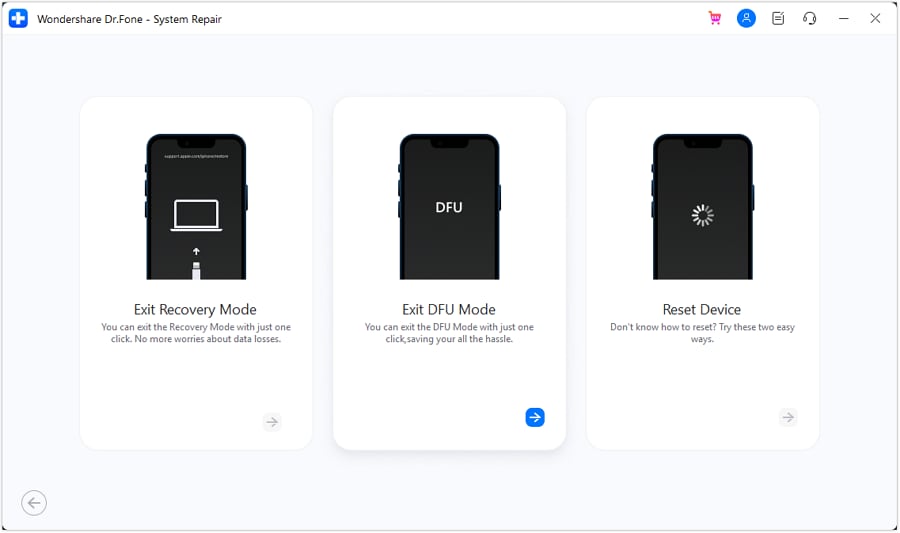
- Step 2: Follow On-Screen Instructions to Exit
On the next screen, you will be provided with an on-screen set of instructions to put an iOS device out of DFU mode. Select any particular iPhone model range your device lies in and follow the guidelines.
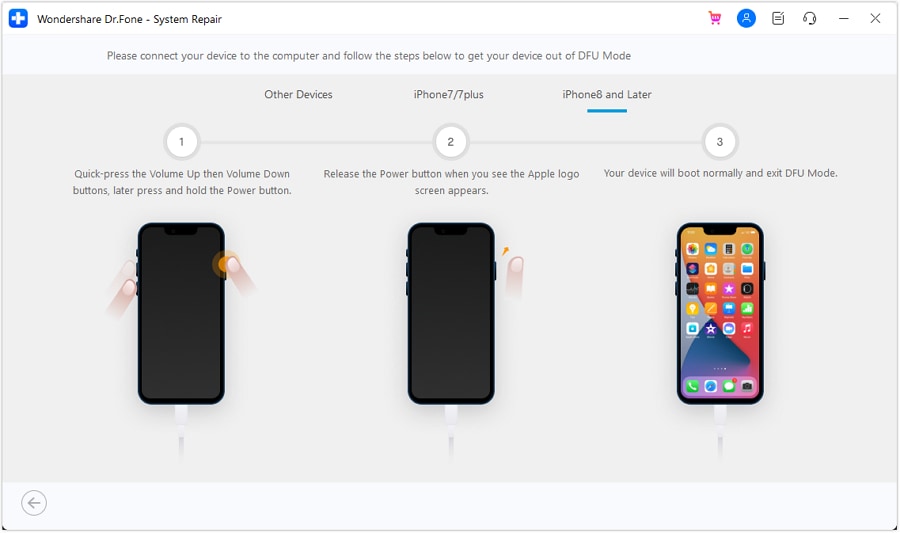
How To Reset Your iPhone 15?
iOS devices that are causing multiple software and system issues need to be reset properly. Wondershare Dr.Fone - System Repair (iOS) comes with a proper system to reset the iOS device. With the help of the tool, you can reset your iOS device by following the guidelines provided below.
Note: Resetting your device may cause you to lose all of your data, including your contacts, photos, messages, and apps. By backing up your iOS data , you can ensure that you have a copy of all your important information and can easily restore it to your device after the reset.
Upgrade to the Newest Dr.Fone Manage Your Phone Wherever You Go
Index
Part 1: General Reset (Free Service)
For the first approach, you can consider the option of performing a general reset which needs to be executed manually by the user. While this does not erase any data of the iOS device, it puts all major settings of the iPhone 15 device to default. Such an approach goes perfectly in situations where you have to resolve issues like not receiving notifications on iOS device or the phone network remains unavailable.
Follow the steps guided below to reset your iOS device properly:
- Step 1: Launch Dr.Fone and Access System Repair
Open Wondershare Dr.Fone after downloading and installing the latest version of the software on the computer. Continue to select Toolbox from the left section and redirect to selecting System Repair from the options.

Dr.Fone Mac version still has the old interface, but it does not affect the use of Dr.Fone function, we will update it as soon as possible.
- Step 2: Select the Nature of the Device
For the next window, select iOS to perform repairing operations for an iOS device.

- Step 3: Access Toolbox Repair
On the next screen, look for the Toolbox Repair option out of all available options since you are considering resetting your device.

- Step 4: Continue to Reset iOS Device
As you lead to the next screen, multiple options appear on the front, out of which you are advised to select Reset Device.
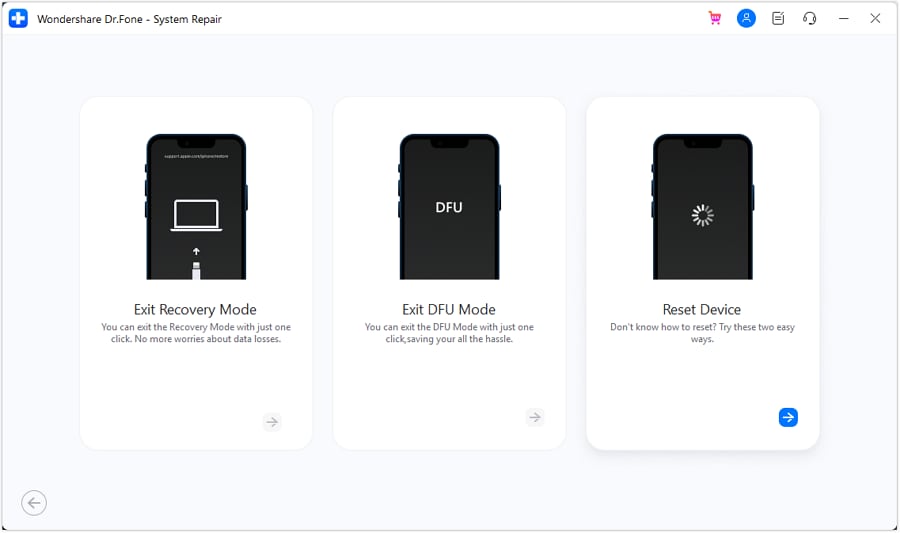
- Step 5: Proceed to a General Reset
This particular process is available in two different modes, out of which you have to select General Reset to continue.
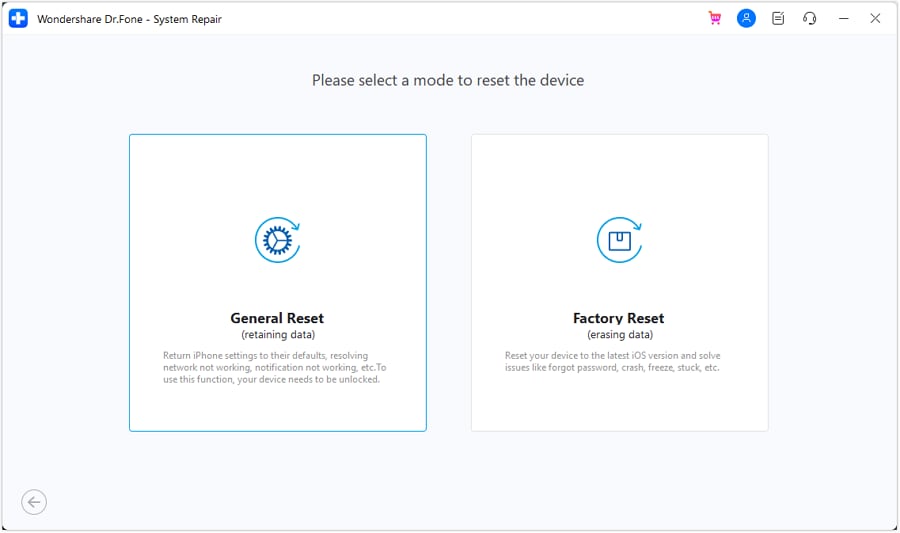
- Step 6: Follow the Instructions to Reset the Device
The screen that appears next displays a composite guide explaining how to reset your iOS device properly. Follow the on-screen instructions to execute the entire process manually.
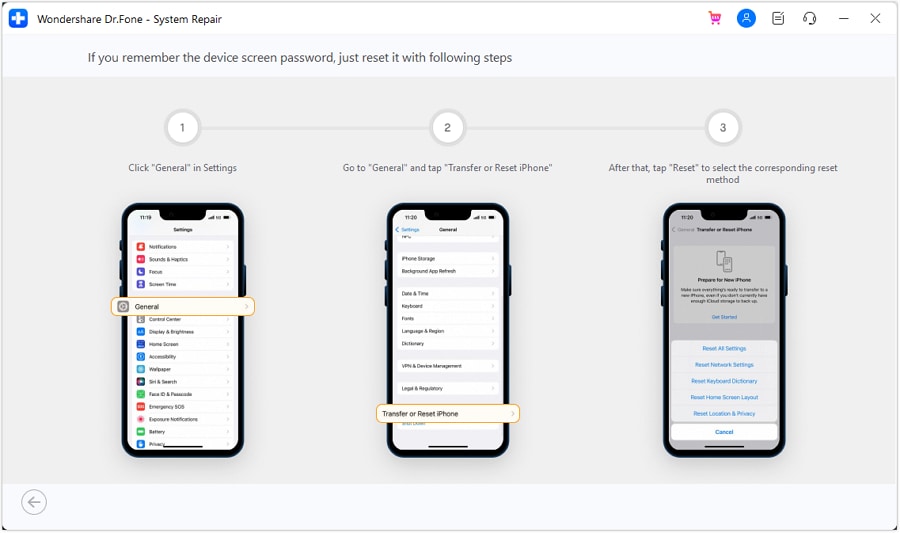
Part 2: Factory Reset (Paid Service)
In situations where you forget the password of your iOS device or get stuck at a point where it stops working, Dr.Fone - System Repair (iOS) comes with an option of performing a factory reset through the service.
For an understanding of how to reset your iOS device with Dr.Fone - System Repair (iOS) using the factory reset method, follow the instructions provided next:
- Step 1: Proceed to Reset Device Option
As you lead into the Toolbox Repair option, select the Reset Device button to proceed with resetting your iOS device.

- Step 2: Initiate Factory Reset on the Device
Continue on the next screen to select Factory Reset to perform a comprehensive reset on the iOS device.
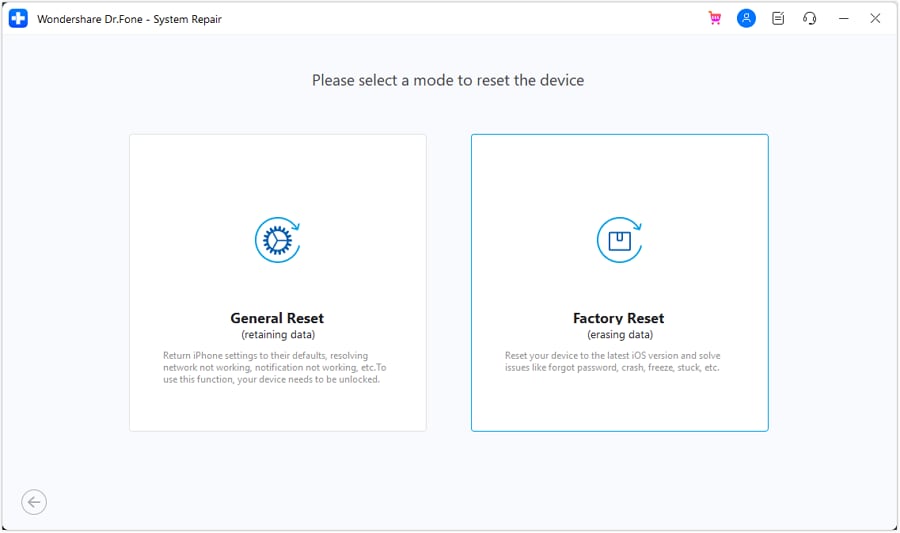
- Step 3: Put iOS device in Recovery Mode
On the next window, follow the on-screen instructions to put your iOS device in Recovery Mode. Select the model of the iPhone 15 device according to your conditions. However, if you are not able to put your iOS device in Recovery Mode, click the Try DFU Mode option on the bottom-left of the screen.
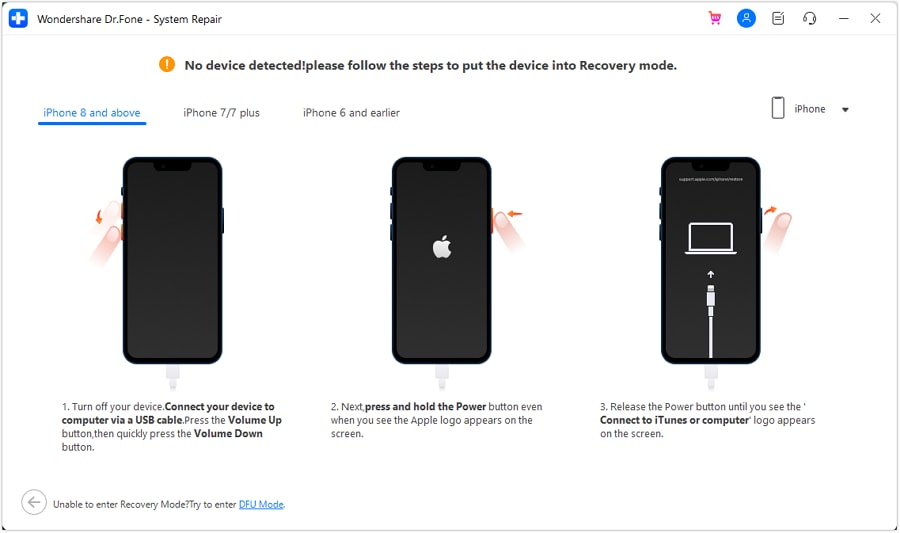- Step 4: Download Respective iOS Firmware
Once the device is in Recovery or DFU Mode, the platform automatically detects the connected device and displays a set of iOS firmware that can be downloaded on the device. Click Download against any iOS firmware to initiate the download.
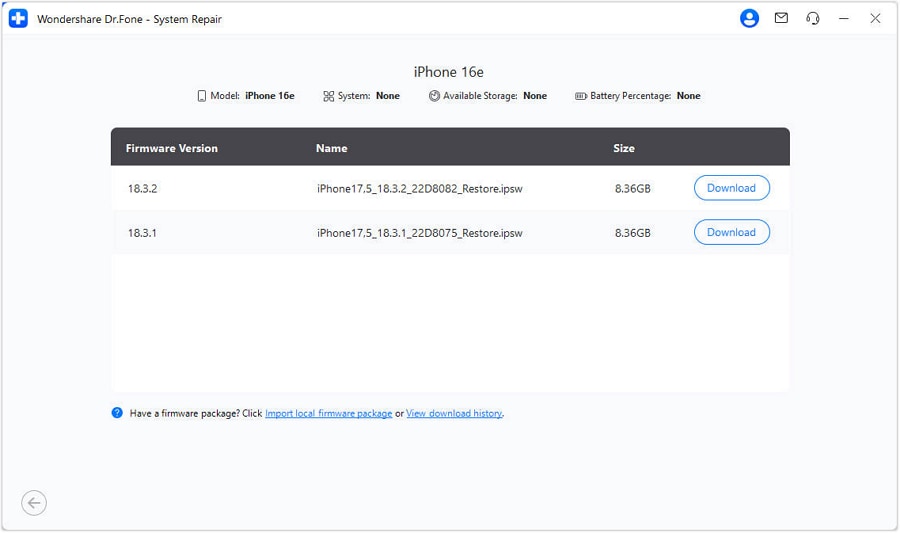
- Step 5: Start Installation of iOS Firmware
As the firmware starts downloading on the platform, it is made available for installation after verification.
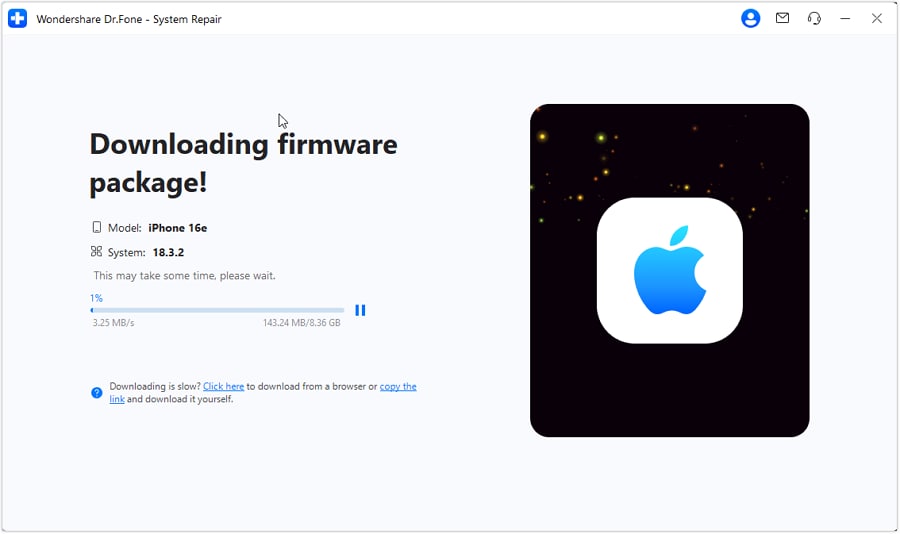
For installing the iOS firmware on the device, choose the Repair Now option to proceed next.
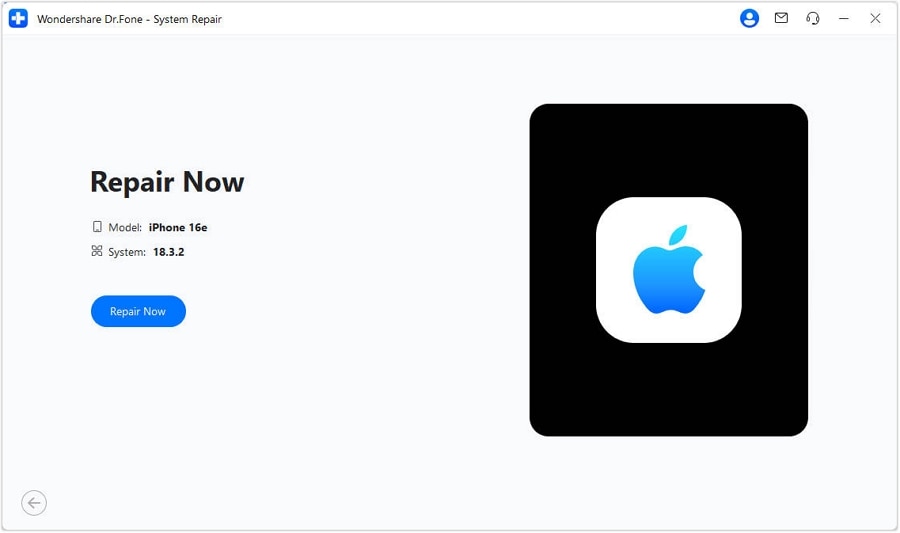- Step 6: Conclude Resetting the iOS Device
Not the progress of the iOS firmware on the following screen and wait until it is completely installed on the device.
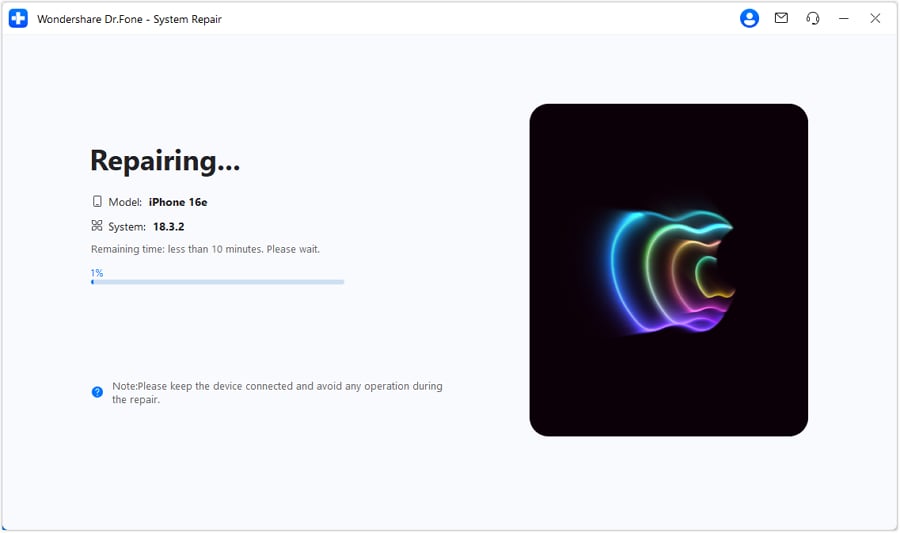
A prompt message of completion will appear on the screen showing the successful installation of the iOS firmware on the device.
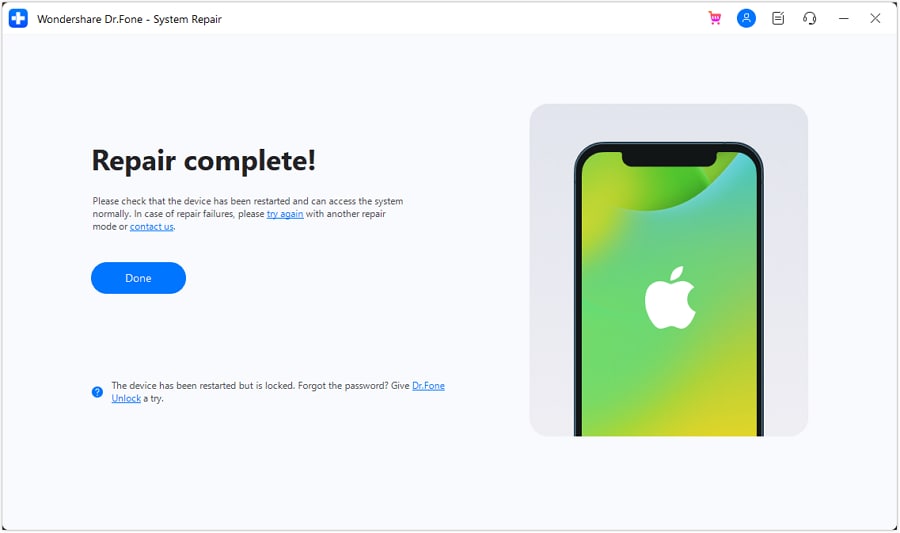
How To Install the Latest iOS/iPadOS Beta Version on iPhone 15?
Every year, Apple comes with its latest release of iOS under the banner of upgrading the iPhone 15 device’s operations. Similarly, with every iOS upgrade, a dedicated iOS beta release is expected before the final release. Many people are curious about installing the beta version and wish to try iOS before anyone else. Thus, Dr.Fone - System Repair (iOS) comes with an advanced option of updating devices to the iOS public beta, as discussed in the guide.
Upgrade to the Newest Dr.Fone Manage Your Phone Wherever You Go
- Step 1: Proceed With System Repair
Launch Wondershare Dr.Fone on your computer after successfully downloading and installing the tool. Continue to select System Repair from the Toolbox section to launch it.

Dr.Fone Mac version still has the old interface, but it does not affect the use of Dr.Fone function, we will update it as soon as possible.
- Step 2: Select Device Type
You are advised to select iOS from the next screen as you will be installing the public beta on an iDevice.

- Step 3: Continue For Installing iOS Beta Version
From the next set of options appearing on the screen, you must select Explore iOS Beta Features to proceed with the installation of iOS public beta on your iDevice.
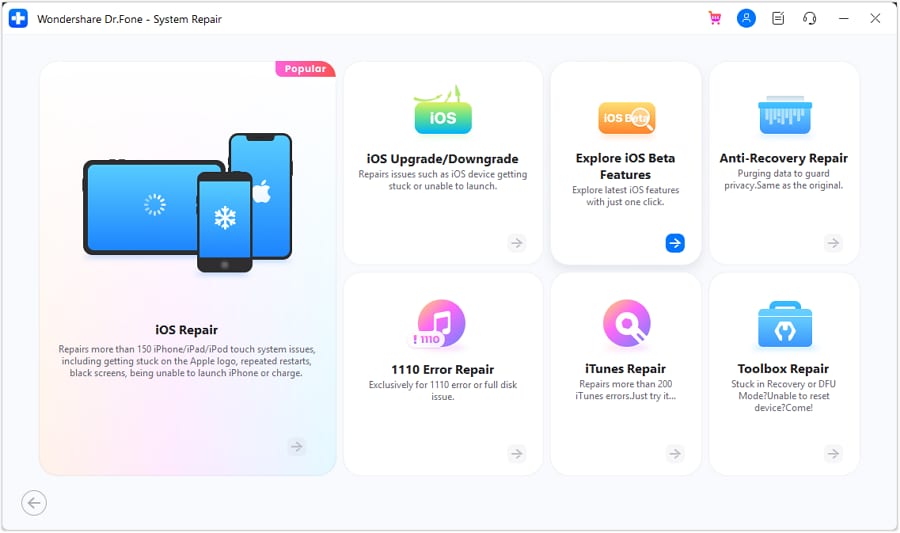
- Step 4: Connect iDevice With USB
Following this, you will have to connect your iDevice, which is to be upgraded with a cable connection.
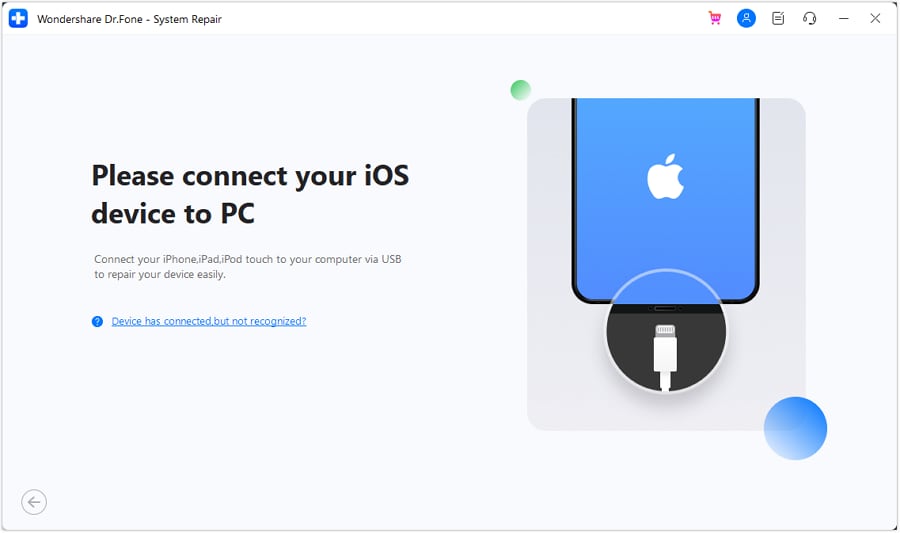
As the connection is established, the platform detects the device on the computer automatically.
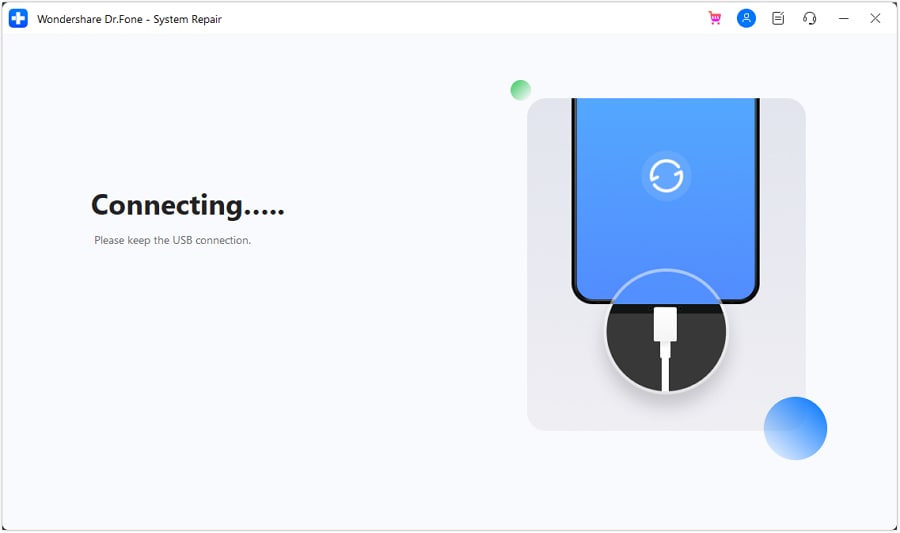
- Step 5: Download the Required iOS Beta Firmware
The next screen displays the beta versions installed on the iPhone 15. Click Download adjacent to a particular version and continue.
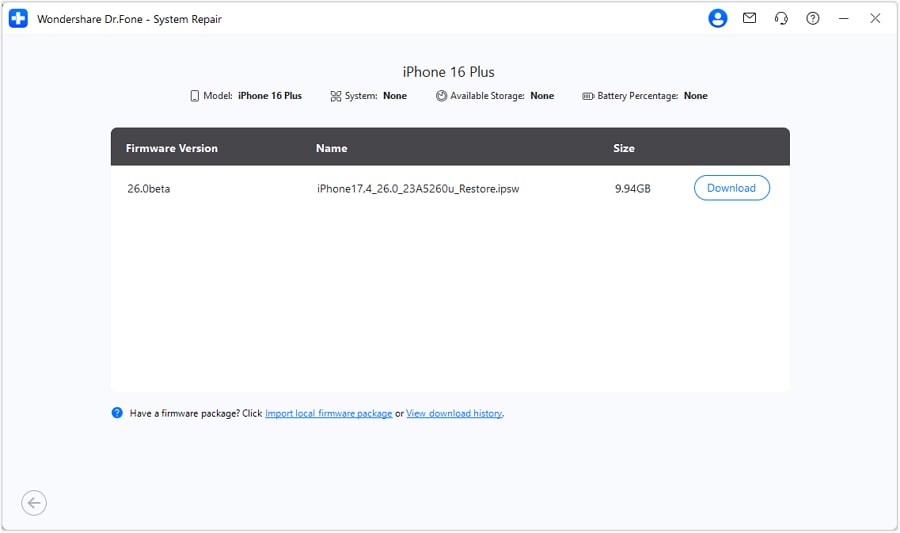
- Step 6: Continue to Download the iOS Beta On Platform
The following screen shows the initiation of downloading the iOS beta version on your iDevice.
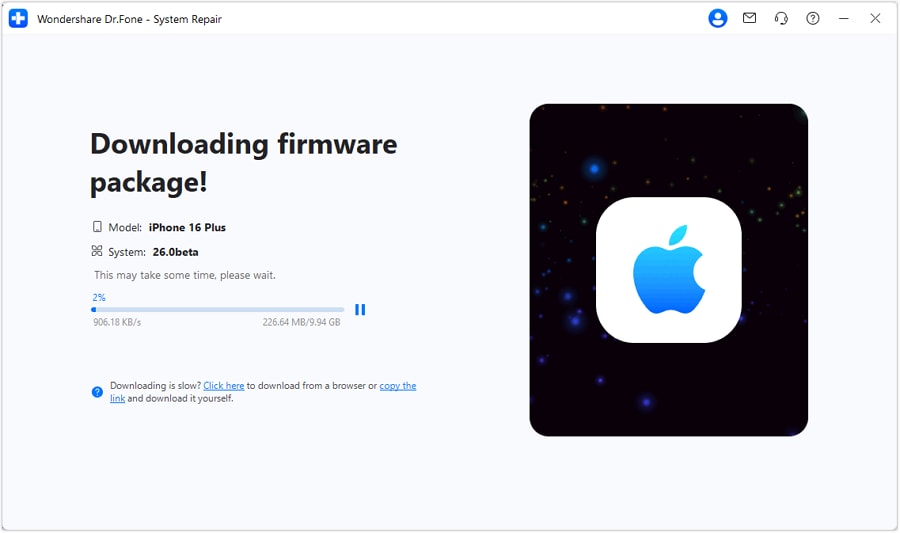
- Step 7: Verify and Install iOS Beta on iPhone 15
As the iOS firmware installs successfully, it is verified by the platform and made available for installation on the device. Continue to click Repair Now to redirect toward the installation of the firmware.
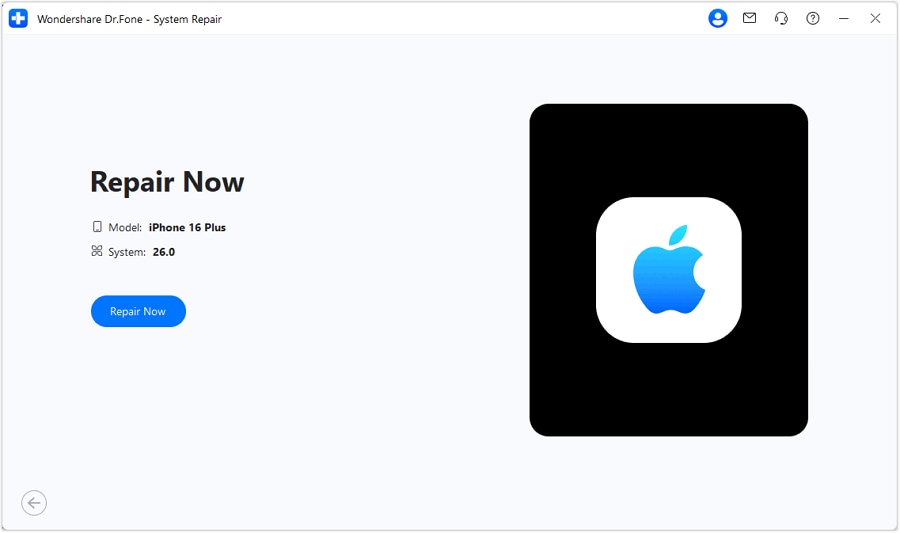
- Step 8: Conclude Installation of iOS Public Beta
The progress bar shows the completion of the process.
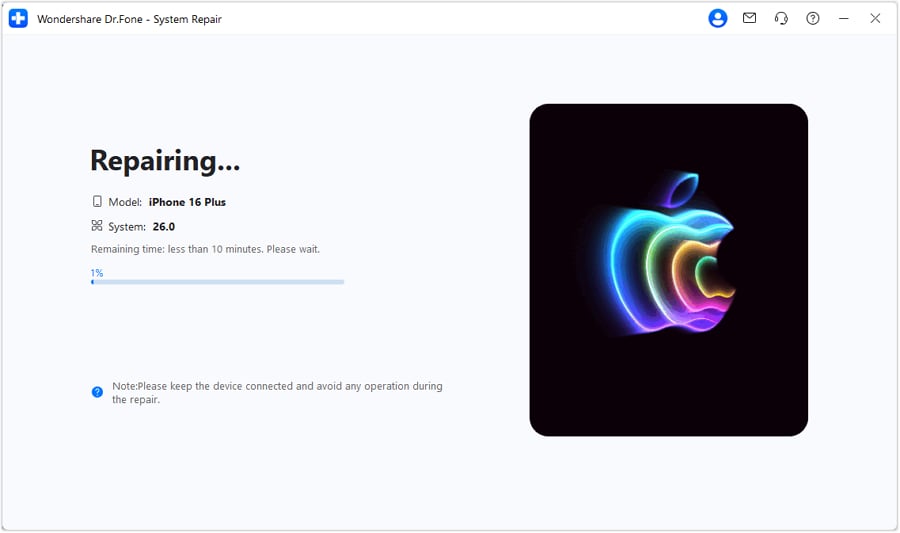
Once it is concluded, a prompt message appears on the window. You are advised to click Done to finish the process.

- Title: How To Exit Recovery Mode on iPhone 15? | Dr.fone
- Author: Nova
- Created at : 2024-08-20 20:55:14
- Updated at : 2024-08-21 20:55:14
- Link: https://blog-min.techidaily.com/how-to-exit-recovery-mode-on-iphone-15-drfone-by-drfone-ios-system-repair-ios-system-repair/
- License: This work is licensed under CC BY-NC-SA 4.0.

